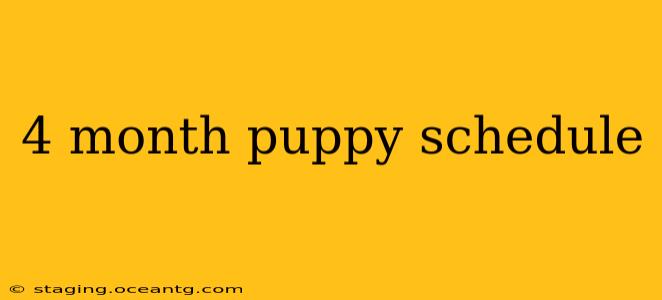A four-month-old puppy is a bundle of energy, curiosity, and—let's be honest—a bit of mischief! This is a crucial stage in their development, transitioning from a playful pup to a more independent young dog. Creating a consistent schedule helps your puppy thrive, learn good habits, and develop into a well-adjusted adult. This guide provides a sample schedule and addresses common questions about caring for a four-month-old puppy. Remember, this is a guideline; adjust it to suit your puppy's individual needs and breed.
Understanding Your Puppy's Needs at 4 Months
Before diving into a sample schedule, let's understand what your four-month-old puppy needs:
- Consistent Routine: Predictability is key at this age. A structured daily schedule reduces anxiety and helps your puppy learn what to expect.
- Regular Exercise: Four-month-old puppies have boundless energy. Daily walks, playtime, and mental stimulation are crucial for their physical and mental well-being. Avoid overexertion, though; their joints are still developing.
- Socialization: This is a critical period for socialization. Expose your puppy to various sights, sounds, people, and other dogs in a safe and controlled manner to help them develop into a well-adjusted adult.
- Training: Continue with positive reinforcement training, focusing on basic commands like sit, stay, come, and down. Keep training sessions short and fun to maintain your puppy's engagement.
- Rest: Puppies need plenty of sleep. Ensure your puppy has quiet, comfortable places to rest throughout the day.
Sample 4-Month-Old Puppy Daily Schedule
This schedule is a suggestion and should be adapted to your puppy's breed, energy levels, and your lifestyle.
Morning:
- 7:00 AM: Wake up, potty break, and a quick playtime session.
- 7:30 AM: Breakfast.
- 8:00 AM - 9:00 AM: Potty break, short walk, and training session (15-20 minutes). Focus on a few commands.
- 9:00 AM - 12:00 PM: Playtime, chewing toys, or a quiet rest.
Afternoon:
- 12:00 PM: Lunch.
- 12:30 PM - 2:30 PM: Nap time. Provide a quiet, dark space.
- 2:30 PM: Potty break, short walk.
Evening:
- 4:00 PM: Playtime, social interaction (if appropriate).
- 5:00 PM: Dinner.
- 6:00 PM - 7:00 PM: Potty break, calm playtime, and more training.
- 7:00 PM - 8:00 PM: Wind-down time, quieter activities.
- 8:00 PM: Final potty break before bedtime.
- 8:30 PM: Bedtime.
How Much Sleep Does a 4-Month-Old Puppy Need?
How much sleep does a 4-month-old puppy need? A four-month-old puppy needs approximately 18-20 hours of sleep per day. This sleep is crucial for their growth and development. Ensure they have access to a comfortable, quiet bed.
How Often Should I Feed My 4-Month-Old Puppy?
How often should I feed my 4-month-old puppy? Most four-month-old puppies benefit from three meals a day. Check your puppy's food packaging for feeding guidelines based on their weight and breed.
How Often Should I Take My 4-Month-Old Puppy Outside to Potty?
How often should I take my 4-month-old puppy outside to potty? Puppies at this age need to go outside frequently, typically every 2-3 hours, or immediately after waking up, eating, and playing.
What Kind of Exercise Does a 4-Month-Old Puppy Need?
What kind of exercise does a 4-month-old puppy need? Moderate exercise is essential. This includes short walks (avoid intense runs), playtime in a safe area, and interactive games like fetch or tug-of-war. Avoid overexertion.
Should I Crate Train My 4-Month-Old Puppy?
Crate training can be beneficial for house training and providing your puppy with a safe and secure space. However, it's vital to introduce the crate positively to prevent anxiety.
Remember the Importance of Consistency
Consistency is crucial for success. A consistent schedule, coupled with positive reinforcement training, will help your puppy learn and thrive. Remember to celebrate successes, and be patient; accidents happen. With patience, consistency, and love, you'll have a well-adjusted and happy canine companion.
